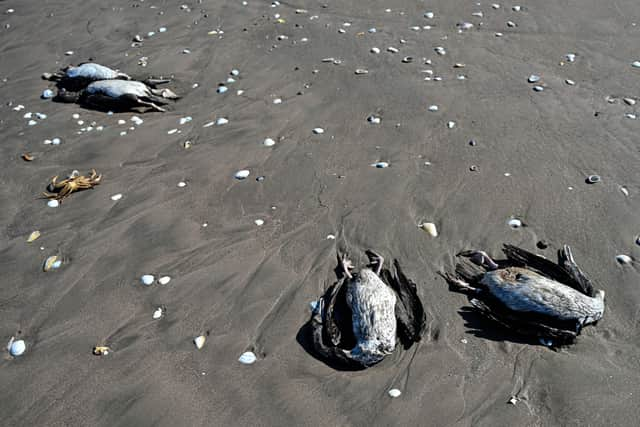Bird flu: Warning to holidaymakers as thousands of infected birds found on UK beaches - full list of affected areas
and live on Freeview channel 276
Holidaymakers are being urged to stay away from dead or sick birds washed up on UK beaches as thousands have been found along coastlines infected with avian flu.
In the past month hundreds of dead birds washed up on UK beaches are suspected to have been infected with bird flu which continues to ravage wild populations.
Advertisement
Hide AdAdvertisement
Hide AdThe Royal Society for the Protection of Birds (RSPB) has warned the spread among seabird populations is a "crisis that could become a catastrophe".
The UK Health Security Agency (UKHSA) said the risk to humans is “very low” but beachgoers have been warned to keep dogs on leads and to report sightings of dead or sick birds to the authorities.
While human infections are extremely rare, bird flu can be spread through close contact with infected birds and their droppings.
Highly Pathogenic Avian Influenza (HPAI) is the more serious type of bird flu which is often fatal in birds. The main symptoms that will show in an infected bird include a swollen head, closed and excessively watery eyes, incoordination and loss of balance, drooping of the wings and/or dragging of legs, as well as several birds affected in the same space.
Advertisement
Hide AdAdvertisement
Hide Ad

James Parkin, director of nature and tourism for the Pembrokeshire Coast National Park Authority, said local rangers have so far collected around 700 to 800 birds.
The species of birds includes guillemots, razorbills and gannets.
He said the area seeing its second wave of bird flu is “devastating news”.
Rhian Sula, general manager for the National Trust, told the BBC its staff were out on beaches warning visitors of bird flu as “not all visitors” have good awareness of the virus "not all visitors do".
Advertisement
Hide AdAdvertisement
Hide AdShe said: "As much as we have placed warning signs out, they may not see them or they may ignore them so we are having to have those conversations about why it is important to keep dogs on the lead and keep away from the birds.”
The UK has currently seen 190 confirmed cases of HPAI H5N1 since October 2022.
Since 2021, 21 of the UK’s 25 breeding seabird species have now tested positive for the virus.
The RSPB is currently carrying out seabird population counts across the UK to see how badly colonies have been affected, while the UK’s home nation administrations also said they were monitoring the situation and the long-term impact of bird flu on wild bird populations.
Advertisement
Hide AdAdvertisement
Hide AdThe UK’s chief veterinary officer Christine Middlemiss said the government has “taken wider measures to support seabirds through the marine wildlife bycatch mitigation initiative and will publish an English seabird Conservation and recovery pathway that will assess seabird vulnerabilities and the actions needed to address them."
A Welsh government spokeswoman said it would be consulting on a seabird conservation strategy next year, and a Scottish government spokesperson said its seabird conservation strategy was "in development" and it would "consult on the plan in due course".
Which locations have been affected?
Birds infected with avian flu have been found washed up on beaches across the UK, including along the Sefton Coast, on beaches near Blackpool, at Stonehaven Beach in Aberdeenshire, on the Isle of Man and along the south Pembrokeshire coast.
Here are locations where dead birds have been found:
- St Aidan’s nature reserve, near Leeds
- Saltholme near Middlesbrough
- Stonehaven beach, Aberdeen
- Sefton Coast
- Beaches near Blackpool
- Fenella Beach, Isle of Man
- Penally, Freshwater East and Marros beaches, South Pembrokeshire coast
- Anglesey beach, Wales
Comment Guidelines
National World encourages reader discussion on our stories. User feedback, insights and back-and-forth exchanges add a rich layer of context to reporting. Please review our Community Guidelines before commenting.
